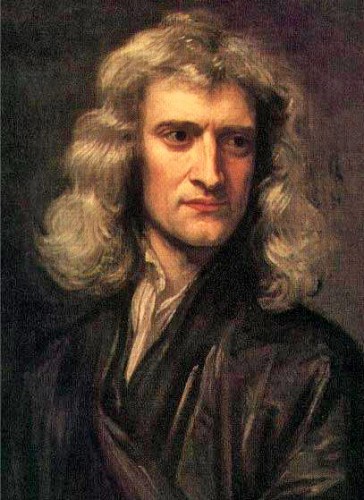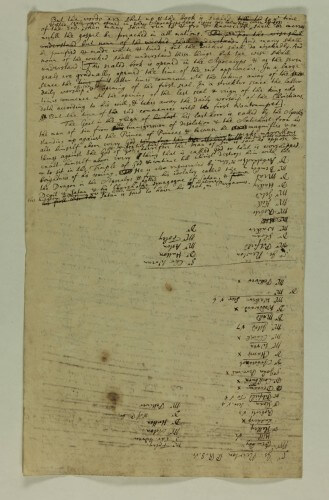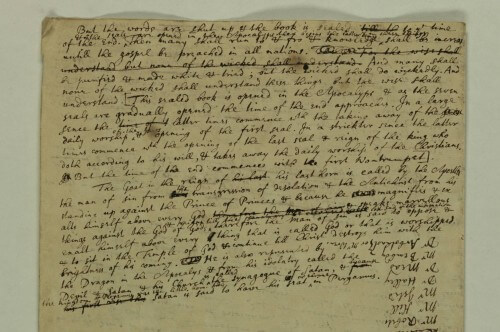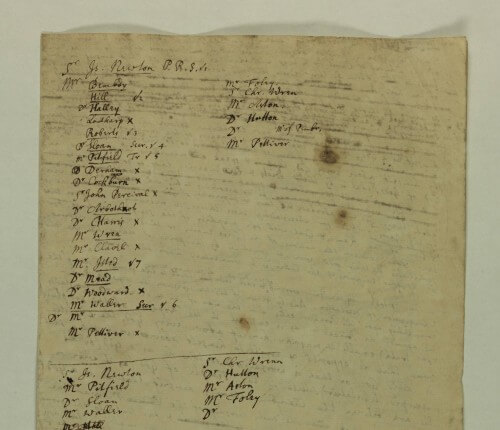The collection of writings was purchased by the Orientalist Avraham Shalom Yehuda following an auction held in London in 1936. At the end of his days, Yehuda chose to donate his collections to the National Library, and they reached it in the late 60s. Contrary to what might be expected, Newton's writings do not deal with the natural sciences, but rather focus on the field of theology, and especially on the interpretation of the Holy Scriptures, the history of ancient cultures, the structure of the Tabernacle and the Temple, Kitzin's calculations and history. Few of them deal with alchemy, a field in which Newton also had a great interest.

The collection of writings was purchased by the Orientalist Avraham Shalom Yehuda following an auction held in London in 1936. At the end of his days, Yehuda chose to donate his collections to the National Library, and they reached it in the late 60s. Contrary to what might be expected, Newton's writings do not deal with the natural sciences, but rather focus on the field of theology, and especially on the interpretation of the Holy Scriptures, the history of ancient cultures, the structure of the Tabernacle and the Temple, Kitzin's calculations and history. Few of them deal with alchemy, a field in which Newton also had a great interest.
Contrary to the common view today that science and faith are separate from each other, Newton believed that the two are intertwined and that God is the author of two books: the book of science and the Holy Scriptures. In his view, these two books are the key to understanding the world on the one hand, and understanding the course of history from its beginning to its end on the other. The physicist and the theologian existed in him in harmony side by side.
It is surprising that along with being a researcher immersed in theology, science, physics, religion and history, Newton was also a practical person who understood well the existence of this world. Newton held official public and administrative positions and displayed impressive skills. Among other things, Newton was appointed in 1696 as head of the Royal Mint in London and in 1703 as president of the Royal Society. The writings preserved in the library present us with these two aspects, and sometimes they even appear on the very same page.
The big universe versus the "small politics"



Collection The theological and alchemical writings of Isaac Newton The one in the National Library in Jerusalem was included this week On UNESCO's "Memorial of the World" list which preserves the written collections that have contributed to human development throughout history.
In 1709, when he served as president of the Royal Society of London (Royal Society), which was engaged in promoting the study of knowledge through the experimental method, Newton quarreled with some of his partners. Newton decided to move the headquarters of the company for political reasons and strengthen his control by eliminating his opponents. For this purpose, Newton made a list of council members whom he wanted to replace. Newton wrote this list on the same page dealing with the end of the world. You can see the X's next to the names of the people Newton didn't want to see. The wonder and wonder - none of those "marked" managed to be re-elected to the council.
Not for nothing did the UNESCO committee choose to add these writings to the list of items that should be enshrined in the "Memory of the World": Newton's theological (and alchemical) writings present unusual and fascinating angles of a key personality in the history of science and human history.
Newton's writings were fully uploaded to the National Library website, and are available to the general public. All articles are also linked for the Newton Project (The Newton Project) in which transcriptions of the manuscripts are presented in two versions: a diplomatic version, which includes all the changes and corrections as they appear in the manuscript, and a clean version, which allows the text to be read sequentially.

46 תגובות
Life
With all due respect to Darwin, he was not that original. He was preceded by Jean-Baptiste de Lamarck and others.
A. Benner
In general relativity, an object in free fall is subject to no force and is an inertial body moving along a geodesic
https://en.wikipedia.org/wiki/Free_fall
To all the writers here, and especially to Eddie.
Although I greatly admired the work of Newton, I regard the work of Charles Darwin much more highly. (in the sense of importance, not in the sense of complexity)
Newton's theory does not contradict religion. It will always be possible to say that God created the world in the format of a large clock. His teachings were well integrated into the scientific thinking of the time. He is not required to go outside the box. He leans on Archimedes, Galileo Galilei, Descartes. and greatly assisted by the observations of Tycho Braha.
On the other hand, Darwin not only came out of the box, he even had to break it. He really had to think contrary to what was customary at the time.
And when they say there is a contradiction between science and religion - we don't mean Newton (Eddie, mind you). We mean a lot of Darwin and even quantum theory and relativity.
Needless to say, Newton was not aware of Darwin's theory, who lived about 150 years after him.
As science develops, religion recedes. And her priests are busy plastering and sealing cracks. The age of the world is already beginning to be digested in the church. In Judaism they came up with a new invention: the world was created 6000 years ago in such a way that it would look as if.... and I hear religious people who express themselves strangely "thanks to prayer and medicine, the injured person remains alive...".
The great importance of Darwin's theory is that he showed that life develops and changes and has one origin. His teachings are not compatible with religion. no religion Nowhere and no time. And his teachings are confirmed every day every hour, along with the medical and biological sciences.
Israel Shapira
Einstein did not say what you attributed to him, as if no force acts on a body in free fall. He did say that in a system moving under the influence of the same force it appears as if no force is acting on the body.
The term "free fall" already defines a force acting on the body. Otherwise it was "steady movement".
The mistake is not Einstein's and not Newton's but... your.
Come on, Shane.
poker.
Eddie
If you are talking about me... I have a master's degree in philosophy of science. And I firmly stand by my opinion that there is a contradiction between religion and science. There are many contradictions, and it is possible to expand on them and explain them.
And if you're not talking about me... then no hints 🙂
And what did you learn?
Israel
I didn't call anyone a liar.
Apparently there are some people here, with particularly big egos. Fortunately for us there are not too many, but for us they are fanatics in their materialistic and pseudo-rational religion, and obsessed with writing and spreading their musings and beliefs. Only in the best case can they be forgiven for their mistakes, and assume that they simply suffer from excess time and excessive idealism.
The trouble is that their egos are so big that they allow themselves to dismiss with unbearable lightness the ideas and thoughts of people bigger than them by unimaginable orders of magnitude. One of them, for example, is sure that metaphysics (like Newton's, for example) is "a term almost synonymous" with "declaration of ignorance", no less!... Yet another one of his kind is willing to admit that Newton was a "wise man" but if he knew what If we (ie - he, the one with the big ego 'knows') then it is likely that Newton would have realized that he was wrong... And I ask - who is the declared fool here, and who is the wise one here?
I actually think that it is quite reasonable to assume that Newton, if he knew the theoretical and empirical physical knowledge that we know (and in fact, do not really 'know' - the existing scientific empirical inventory is partial and sometimes flawed, the theories are only supposed to give a 'good explanation' for the partial and flawed empirical findings and are always limited and even stand in contradictions and bewilderment with other theories in the field, etc.) - he was indeed very strong in his basic theological insights. He would probably have made relatively technical or side corrections in his thinking (for example, those that are linked to certain paradigmatic aspects of the theory of relativity, and perhaps he would have offered a better theory), but continued to hold to his fundamental theological paradigm. We are allowed to share this credit with this genius.
I can also assume that none of the aforementioned ego owners, because of their big egos (but not only because of that...), has not studied or even glanced at any article about Newton's theological writings, and has no real idea about them. I can assume that none of them studied philosophy, certainly not modern very ordered and logical methods of thought such as those of the great logician Gedel (among other things - also a mathematician), a giant like Whitehead (who was, among other things, a mathematician and philosopher) or a wonderful modal philosopher like Adams, In his variation on Anselm's arguments, e.g. And there are a few more. The point is that all of these relate, in different ways, to Newton's theological thought.
I can also surmise that the owners of the aforementioned big egos also did not read the reasoning of the expert members of the UNESCO committee when they decided to grant the honorable status to Newton's theological writings, and certainly not only because everything about the UN is a convention.
I suppose that if they were a little less ignorant and arrogant, and with a little more optimal ego and with more intellectual honesty, modesty and humility, they would probably understand at least the basic theological ideas of Newton and how they might be attacked by some modern and scientifically based methods of thought Logic is the brainchild of personalities whose rationality cannot be doubted. If they were, they would probably spare us their embarrassing statements. They would also finally give way to some much more competent commenters who wrote on this site years ago, and probably despaired of the inferiority and low thoughts of the ego-possessed and ignorant, and stopped writing any more.
Israel
And here is another mistake of Yitzchak - today there is no traffic from a distance.
In any case, it is incredible hypocrisy to say that there is no contradiction between religion and science. Religion is based on causality, and science shows that there is no causality... So religion (David in this case) invents "meta-causality"... Religion (Raphael in this case) claims that there are laws of nature, and also claims that these laws can be violated....
Who knows what the boss wants? Please, God is great. Israel is just a small pawn in the great game of life. Leaving universe-spanning theological questions to Rambam Dawkins and miracles.
The practice of alchemy was legitimate in Newton's time, and laid the foundation for chemistry. According to Glick, alchemy helped Newton formulate the law of gravitation by convincing him that action at a distance existed.
Raphael
It's nice that you know what Newton knows, without any understanding or sophistication. Really well done. Newton also believed in alchemy - you surely have a deep explanation for this belief as well. I would love to hear 🙂
Say - don't you have any opinion of your own?
Israel
Who knows what the boss wants? The rabbi or the priest?
Miracles
Newton did not think there was a contradiction. But this is because he knew very well both science and theology. The problem with those who think there is a contradiction is that he knows science well but not theology and why doesn't he know theology? Because because of his prejudices he despised it and those who study it.
Please Eraf, I probably don't understand enough of both.
In my opinion there is one central issue: is there or is there no boss?
Because if there isn't, everything is regrettable. But if there is, it is possible to understand (even if we don't understand) its strange constitutions and commandments, just as we accept the strangeness of quantum mechanics.
Israel/Raphael
All this does not change the idea that there is an abysmal contradiction between religion and science.
Miracles
To do good science, like good music, it is not enough that you study and memorize formulas or learn to play many instruments.
There is this matter of talent.
And that is first and foremost what Mozart or Newton had.
Did you know he didn't pass the course at Infi?
Ah, there was no infinity yet, he invented it..
Miracles
I of course agree with Israel Shapira and in addition -
We already agreed here a few weeks ago that the majority in this case does not determine.
Israel
"Knowledge of music"? We also have much more knowledge about World War II than Newton did. But what does it have to do with it?
Miracles
Also every academy graduate today has much more musical knowledge than any musician in the 18th century.
That doesn't make him Mozart.
Raphael
And without exaggerating - every science graduate today has more knowledge than Newton about the physical world.
Raphael
I agree with you. But, what do you say about the fact that a very large majority of scientists do not believe in God?
Newton was also an alchemist, and was a staunch Christian - so do you also accept these opinions of his?
Miracles
Newton and the other respected religious scientists you mentioned do not think there is a contradiction. But what are they compared to you?
Raphael
If you are so sure of your words, go to the researchers in the physics department at Bar Ilan and present your thesis to them. I hope that there you will learn a chapter in scientific law. If you say you don't need it, it will testify against you and against you.
Raphael
I do not understand what you are saying. There is a great contradiction between the story of Genesis and what we know from scientific investigation.
Do you think otherwise?
Miracles
Read your last response to me and maybe you will understand.
It means comments to an untruthful speaker who believes his words.
K.
Lorenz continued to believe in the existence of the ether even many years after Einstein published relativity. So is Michaelson, Morley and many others. Are they liars? Is Lord Calvin a liar? Or maybe there is just cognitive dissonance here?
A liar is a person who knowingly and maliciously tells an untruth. If you commented to him, in many cases your words have the value of an opinion that is not necessarily binding on that person.
Newton was a mega scientist as well as a mega dos. Glick says in his book about him that he studied the Holy Scriptures and the Holy Trinity with the same meticulousness with which he studied nature. The fear of the Inquisition was not on him as it was on his predecessor Galileo or Bruno, an ardent admirer of Dawkins.
He really believed in the existence of God, as evidenced by our writings.
And I don't believe it, it makes me wonder that maybe such a genius in the study of nature saw something that I and others are missing.
Raphael
Newton was religious. Other distinguished physicists were also religious.
Why do you mention that?
A lion in hiding
What do you think of this latest statement from K:
"It happens too often when ungrateful religious people lie with a determined forehead."
Obviously, she meant me, among other things.
What do you suggest? Should I pay her back or keep quiet?
Israel,
Not telling the truth is often, and quite simply, telling a lie, especially when the "error" was brought to the attention of the respondents. I admit that I did not check the appropriateness of the use of this word every time it was written, but I do not remember examples where commenters were called that after making an error that was made in good faith (and which was corrected after it was explained where the error was or a legitimate argument was given why it was not an error). I do believe that this word is said many times quite accurately, and unfortunately, really unfortunately, it happens too many times when ungrateful religious people lie with a determined forehead. Of course, this deviant behavior does not reflect the entire religious community and certainly they have no ownership of this behavior.
Aryeh Seter,
I have no problem being dirt at everyone's feet. But I'm doing it for her. She needs to learn that if she goes the way of dirtying her mouth with curses and slanders and disrespect then there is a possibility that someone will give it back to her and with an addition. The same goes for miracles and everyone else here. The simplest and easiest thing is to pay you back in the same currency and with interest and I will continue to do so until you stop. I'm never the one to start.
Raphael - you are dirt at her feet! Know that Yom Kippur will not atone for your words...
K.
I will probably have to clarify the poet's intention:
Not telling the truth is not necessarily a lie, and telling the truth is not necessarily a liar. Otherwise one of the two, Newton or Einstein, is a liar.
We hope that this will help to reduce the calls of the "liar" on the site.
Miracles, it sucks that Newton was also religious.
K. You are a disgusting vile liar and posthumous and also retarded.
Israel,
And you know that all there is in science are models of reality, better or less, more or less useful, describe the observed reality more or less. All are ad hoc explanations. It is likely that both Newton and Einstein were wrong, but Newton was probably more wrong (in terms of universal explanation). It makes me a little sad that among all your good questions you also sometimes mix in questions that are more suitable for the crooked way of thinking of people like Raphael.
Raphael,
This isn't the first time you've cheated and lied and I'm sure it won't be the last either. And regarding the "perfection" of the scientific Torah, here again you spit into the well from which you drink every day, you and your family and loved ones. Where does the disgusting disdain you express every time come from? It is no pretense to say that we have a complete Torah with which we can explain every phenomenon in the world. But there is certainly constant progress in obtaining more accurate descriptions of the observed phenomena and in being able to explain a wider range of them, when some of this information is translated into useful technologies and some "only" contributes to increasing our spiritual wealth and causes us sublime feelings. The realization that the atoms of which we are composed were formed in the cores of stars is one such example, one example among many.
Your disdain for the achievements of science is not only unjustified (because the contribution of science can be objectively measured in many fields) but it also reflects deep hypocrisy, because you belong to the group of people who enjoy the products of science the most. In this respect you are a vile and ungrateful person.
Raphael
We know much, much more than in Newton's time. And always, what they don't know - the believers come and say "Aha!!!! This was done by God!!!".
It sucks to be religious...
And the scientific Torah today is complete?
The more you know, the more you understand how much you still don't know...
Raphael
No - that's not true. Newton needed God because his teachings were incomplete. Read the Principia and you will understand.
ק
I never said my beliefs were based on metaphysical logic. This is not the first time you attribute things to me that did not exist and were not created. Newton believed in the creator of the world not because he lacked the knowledge we have today but in spite of it.
ק
I'm falling, I'm falling
Speaking of falling: is there a force acting on a body in free fall or not? Because Newton said yes, Einstein said no.
They both can't be telling the truth, right?
So who is the liar: Newton or Einstein?
Raphael,
Newton was not much, therefore the importance of his beliefs, whatever they were, regarding areas that are not within the framework of the important scientific knowledge that he instilled, both in mathematical calculation methods and in physical insights, is equal to the importance of your own beliefs - that is, they have no importance. The reason is that these beliefs are based - how did you write then? On "metaphysical logic". This may surprise you, but Newton is known and remembered thanks to his tremendous scientific contribution that is reflected in almost everything that your eyes come across around you, and this contribution is actually the product of "normal" logic. If it weren't for this donation, you wouldn't know his name.
In addition, Newton was a man of science, and although in matters he failed to reach scientific insights he turned to metaphysics (a term almost synonymous with declaring ignorance), if he were alive today he would surely be easily convinced that his theory, as ingenious and useful as it may be, is an approximation to a correct description of reality, an approximation that is only appropriate for a certain range of conditions. Newton was easily convinced that there are theories that better describe the reality around us. Therefore, there was probably no reason to call him derogatory names. What would have been amusing was watching him try to explain to you why you talk so much nonsense.
Israel,
Sometimes you seem to be leaning off the fence in a way that makes you worry that you're about to fall (I hope not). I don't know anyone with an engineering background who doesn't know that Newton's laws are an extremely useful but probably universally wrong approximation. I also don't know any engineer who designs structures/machines using calculation tools based on metaphysical logic (well maybe except for Micah Bar-Ilan and Eli Ron and the like).
Raphael
Today we know things that Newton did not know. Newton was a smart man, and probably would have realized that he was wrong.
By the way, his condescending saying "If I could see far, it was because I stood on the shoulders of giants" was said to mock Hawk the dwarf. He also made Leibnitz miserable until the poor man committed suicide.
He also said that a force acts on a body in free fall - the force of gravity. Einstein says no.
So they would probably also call him a liar.. him and 80% percent of the engineers, which is what they learned and what they believe.
If Newton were to comment on this site today and say that science and belief in the Creator of the world go together, they would make meatballs out of him.
'theology'? Foy. Where are all the 'enlightened' who will condemn this genius as 'primitive' who has an 'imaginary friend'?